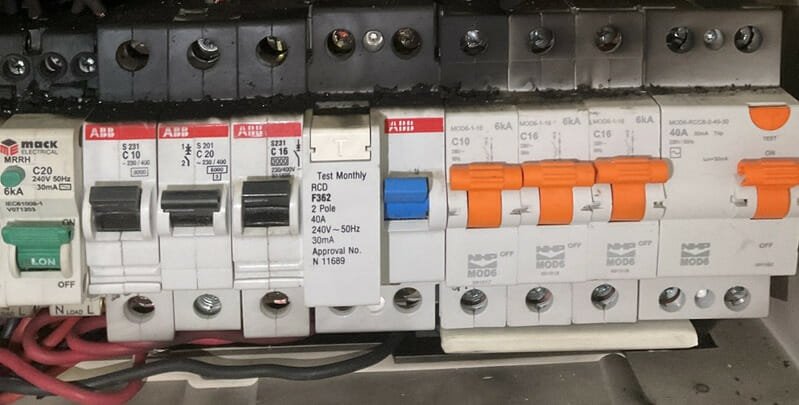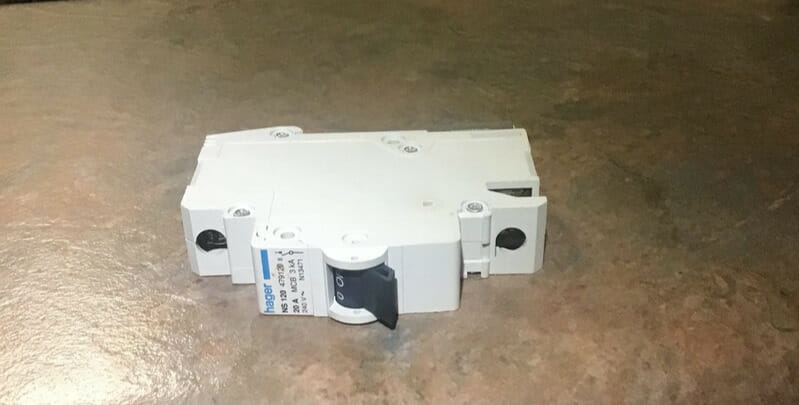
How an Electrical Circuit Breaker Protects Your Home and Appliances
Have you ever wondered how your home stays safe from electrical mishaps? From powering your appliances to keeping the lights on, electricity plays a significant role in our daily lives.
But what happens when something goes wrong? That’s where an electrical circuit breaker steps in.
The Basics of Electrical Circuit Breakers
The essential component known as the electrical circuit breaker is at the core of every electrical system.
These devices serve as the guardians of your electrical infrastructure, tirelessly monitoring and protecting against potential dangers that could wreak havoc on your home and appliances. But what exactly are the basics of electrical circuit breakers?
Simply put, an electrical circuit breaker is a safety device designed to interrupt the flow of electric current in the event of a fault or overload. Think of it as a vigilant gatekeeper, constantly monitoring the flow of electrical power and swiftly springing into action when abnormalities are detected.
The primary function of a circuit breaker is to protect your electrical system from two common hazards: short circuits and overloads.
A short circuit occurs when an unintended connection between two conductive materials, such as wires, causes an excessive current surge. On the other hand, an overload happens when an extreme demand for electrical power surpasses the circuit’s capacity.
To safeguard against these potential dangers, a circuit breaker is installed in your home’s electrical distribution panel or breaker box. This central hub houses multiple circuit breakers, each responsible for protecting your house’s specific branch circuit or area.
The basic construction of a circuit breaker consists of three main components:
- a switch
- an electromagnet
- and a tripping mechanism
The switch allows you to manually turn the circuit breaker on or off, controlling the flow of electricity. The electromagnet detects abnormal current flow and triggers the tripping mechanism.
When an overload or short circuit occurs, the electromagnet becomes energised, activating the tripping mechanism and causing the circuit breaker to trip, interrupting the flow of electricity.
Once the circuit breaker trips, it breaks the electrical circuit, isolating the faulty section and preventing further damage. This action safeguards your electrical system, appliances, and wiring from excessive heat, potential fires, and other hazardous situations.
It’s worth noting that electrical circuit breakers are designed to be resettable, unlike fuses, which require replacement after they have been blown. After a circuit breaker trips, you can restore power by manually resetting it to its “on” position.
Different Types of Circuit Breakers
Circuit breakers come in various types, each designed to cater to specific voltage levels, applications, and protection requirements. Let’s explore some of the different kinds of circuit breakers commonly used:
- Miniature Circuit Breakers (MCBs)
- Moulded Case Circuit Breakers (MCCBs)
- Ground Fault Circuit Interrupters (GFCIs)
- Arc Fault Circuit Interrupters (AFCIs)
- Residual Current Circuit Breakers (RCCBs)
- High Voltage Circuit Breakers
These are just a few examples of the different types of circuit breakers available. Each type serves a specific purpose and offers unique features and capabilities. The selection of a circuit breaker depends on factors such as the voltage level, application requirements, and desired protective functions.
Consulting with a qualified electrician or electrical engineer can help determine the most suitable circuit breaker for a particular electrical system or installation.
The Crucial Role of Circuit Breakers in Electrical Safety
Circuit breakers play a crucial role in maintaining electrical safety by protecting against potential hazards and ensuring the reliable operation of electrical systems.
Overload Protection
One of the primary functions of circuit breakers is to safeguard against overloads. Overloads occur when an excessive demand for electrical power surpasses the circuit’s capacity. In such situations, circuit breakers detect the abnormal current flow and promptly interrupt the circuit, preventing overheating and potential damage to wires, insulation, and connected equipment. Circuit breakers prevent electrical fires and equipment failures by managing and mitigating overloads.
Short Circuit Protection
Short circuits are another common electrical fault circuit breaker. A short circuit occurs when an unintended connection between two conductive materials results in a surge. Circuit breakers detect these high fault currents and swiftly trip, effectively isolating the faulty section and preventing damage to the electrical system. Interrupting the short circuit and cutting off the flow protects circuit breakers against fires, equipment damage, and electrical hazards.
Ground Fault Protection
Ground faults pose a significant risk of electric shock and can be particularly hazardous in areas exposed to moisture, such as bathrooms and kitchens. Circuit breakers with ground fault circuit interrupters (GFCIs) provide additional protection against such hazards. GFCIs continuously monitor the current balance between the hot and neutral wires and quickly trip the circuit if an imbalance is detected, indicating a ground fault. By swiftly interrupting the current, GFCIs prevent electrical shocks and enhance safety in areas with moisture and potential grounding issues.
Fire Prevention
Electrical Circuit breakers with arc fault circuit interrupters (AFCIs) are critical in fire prevention. AFCIs are designed to detect and mitigate the risk of electrical fires caused by arcing faults, which can occur due to damaged wiring, loose connections, or faulty appliances. By continuously monitoring the electrical waveform and promptly tripping the circuit when abnormal arcing is detected, AFCIs prevent sustained arcing that can lead to fires. AFCIs are particularly important in bedrooms, living rooms, and areas where hidden wiring issues can pose a fire hazard.
Selective Coordination
Electrical circuit breakers also contribute to selective coordination, which ensures that only the faulted circuit is isolated while maintaining power to unaffected circuits. Selective coordination is crucial in preventing unnecessary power disruptions and maintaining the continuity of critical systems. By coordinating the operation of circuit breakers in a hierarchy, faults can be localised and isolated, reducing downtime and minimising the impact of electrical faults on the overall electrical system.

Troubleshooting Electrical Circuit Breaker Issues: DIY or Expert Repair
When troubleshooting circuit breaker issues, your approach depends on your expertise level and the problem’s nature. While some minor issues can be resolved through DIY troubleshooting, certain situations require the expertise of a qualified electrician. Here are some considerations to help you decide whether to tackle the troubleshooting yourself or seek professional assistance:
Safety First
Electrical systems can be dangerous, and working with live circuits carries inherent risks. If you are unfamiliar with electrical systems or lack experience in troubleshooting electrical issues, prioritising your safety and seeking professional help is generally recommended. Handling electrical components without the necessary knowledge and precautions can lead to severe injuries or further damage.
Basic Troubleshooting
You can take some basic troubleshooting steps before calling an electrician. These include:
- Checking for overloads: Assess whether the circuit breaker has tripped due to an overload. If so, try to identify the cause by unplugging devices or appliances connected to the circuit and resetting the breaker.
- Inspecting for short circuits: Look for signs of short circuits, such as burnt smells, charred marks, or damaged wires. If you suspect a short circuit, it is advisable to contact a professional electrician, as short circuits can be more complex and hazardous to address.
- Resetting the circuit breaker: A circuit breaker may sometimes trip due to temporary fluctuations or power surges. In such cases, simply resetting the breaker by switching it off and back on can resolve the issue.
Complex Issues
If you encounter complex electrical circuit breaker issues or persistent problems, it is best to consult an electrician. Some scenarios that warrant professional assistance include:
- Frequent tripping: If your circuit breaker frequently trips without an apparent cause, it could indicate underlying wiring issues, ground faults, or overloads. Identifying and resolving these issues may require advanced diagnostic tools and expertise.
- Arcing or sparking: If you observe arcing, sparking, or scorch marks around the circuit breaker, it suggests a serious problem that should be addressed immediately by a professional. These signs indicate potential electrical hazards and can lead to fires or equipment damage if improperly handled.
- Inadequate power supply: If specific areas of your home consistently experience insufficient power or if circuits repeatedly trip under normal load conditions, it may indicate overloaded circuits, faulty wiring, or other electrical issues that require professional evaluation and repair.
Electrical systems are complex, and attempting repairs beyond your skill level can lead to further damage or compromise safety. When in doubt, it is always wise to consult a licensed electrician who can accurately diagnose the problem, provide appropriate solutions, and ensure the security of your electrical system.
Ultimately, deciding to pursue DIY troubleshooting or seek expert repair depends on your comfort level, knowledge, and the issue’s complexity. Prioritising safety and seeking professional assistance can help prevent accidents, ensure proper maintenance, and maintain the integrity of your electrical system.
Your Real Electrical Power Guardians
Electrical circuit breakers are the unsung heroes that protect your home and appliances from potential electrical mishaps. Consulting with experts can help ensure the optimal selection and installation of circuit breakers in your electrical system.
Remember, circuit breakers are not infallible. It is crucial to troubleshoot any issues promptly and effectively. While basic troubleshooting steps can be taken, some situations call for professional assistance, especially when dealing with complex problems, frequent tripping, or signs of arcing or sparking.
The world of circuit breakers is fascinating and vital to your electrical system’s safe and reliable operation. By understanding their role, staying vigilant, and seeking professional help when needed, you can rely on these real electrical power guardians to protect your home and appliances, allowing you to enjoy the benefits of electricity with peace of mind.
Please note: This information is provided for advice purposes only. Regulations differ from state to state, so please consult your local authorities or an industry professional before proceeding with any work. See Cyber Electrical’s Terms & Conditions here.

